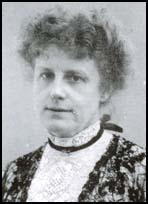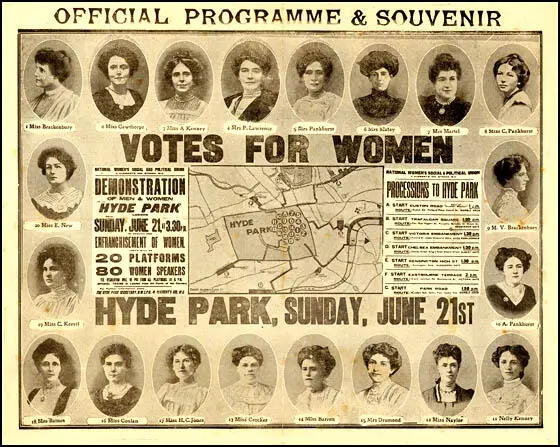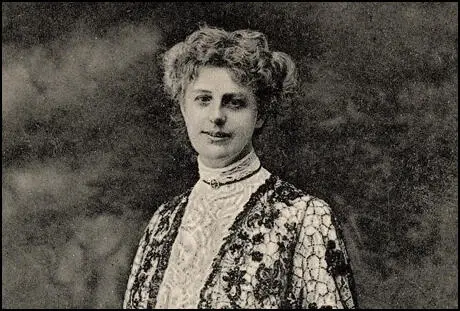Georgina Brackenbury

Georgina Brackenbury, the daughter of Hilda Brackenbury, and the sister of Marie Brackenbury, was born on 1st July 1865. Her father, Charles Brackenbury, was an army general and two of her brothers died while serving in the armed forces.
Brackenbury studied at the Slade Art School from 1888 to 1900. A member of the National Union of Women's Suffrage Societies (NUWSS) she joined the Women's Social and Political Union (WSPU) in March 1907.
In February 1908, Georgina Brackenbury was arrested in February 1908 during a WSPU demonstration outside the House of Commons and was sentenced to six weeks in Holloway Prison.
The WSPU organised a mass meeting to take place on 21 June 1908 called Women's Sunday at Hyde Park. The leadership intended it "would out-rival any of the great franchise demonstrations held by the men" in the 19th century. Sunday was chosen so that as many working women as possible could attend. It is claimed that it attracted a crowd of over 300,000. At the time, it was the largest protest to ever have taken place in Britain. Speakers included Georgina Brackenbury, Emmeline Pankhurst, Christabel Pankhurst, Adela Pankhurst, Emmeline Pethick-Lawrence, Mary Gawthorpe, Jennie Baines, Rachel Barrett, Marie Brackenbury, Gladice Keevil, Annie Kenney, Nellie Martel, Marie Naylor, Flora Drummond and Edith New.

On her release she spoke at meetings all over Britain. She also made a tour of Germany where she gave several speeches on the subject of women's suffrage. In 1909 she joined Annie Kenney, Elsie Howey, Clara Codd, Vera Wentworth, Mary Blathwayt and Mary Phillips the WSPUWest of England campaign. In 1910 she replaced Mary Gawthorpe as WSPU organizer in Manchester.
Georgina visited Eagle House near Batheaston on 22nd July 1910 with her sister Marie Brackenbury. Their host, was Mary Blathwayt, a fellow member of the WSPU. Her father Colonel Linley Blathwayt planted a tree, a Cupressus Macrocarpa Lutea, in her honour in his suffragette arboretum in a field adjacent to the house.
Christabel Pankhurst decided that the WSPU needed to intensify its window-breaking campaign. On 1st March, 1912, a group of suffragettes volunteered to take action in the West End of London. The Daily Graphic reported the following day: "The West End of London last night was the scene of an unexampled outrage on the part of militant suffragists.... Bands of women paraded Regent Street, Piccadilly, the Strand, Oxford Street and Bond Street, smashing windows with stones and hammers."

Georgina Brackenbury and her mother, were both arrested for taking part in the demonstration. Hilda Brackenbury, aged 79, was accused of breaking two windows in the United Service Institution in Whitehall. She served eight days on remand before being sentenced to 14 days in Holloway Prison. Georgina served four weeks in prison.
Mrs Brackenbury's home at 2 Campden Hill Square, London, became known as "Mouse Castle" as members of the WSPU went there to recuperate after being released under the Cat & Mouse Act.
In 1927 Georgina was commissioned by Margaret Haig Thomas to paint the portrait of Emmeline Pankhurst that now hangs in the National Portrait Gallery. According to Elizabeth Crawford, the author of The Suffragette Movement (1999): "It is thought to have been painted from life, although there is in existence a photograph (reproduced as a postcard) of Mrs Pankhurst, wearing exactly the same clothes and jewellery as appear in her portrait. However, the position of the figure differs and doubtless by then Mrs Pankhurst's finances did not allow her an extensive wardrobe."
Georgina Brackenbury died on 27th July 1949. The following year her sister, Marie Brackenbury, died. The last survivor of the immediate family, she left the house to the Over Thirties Association. The Suffragette Fellowship commissioned a plaque to be attached to the house. It read "The Brackenbury trio were so whole-hearted and helpful during all the early strenuously years of the militant suffrage movement. We remember them with honour."

